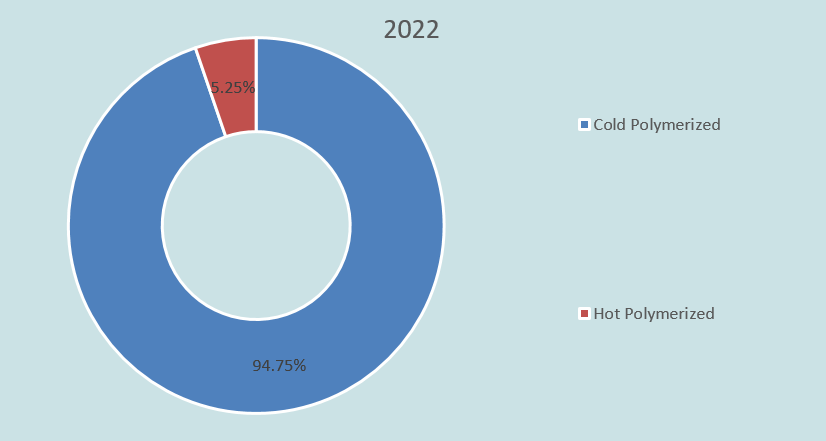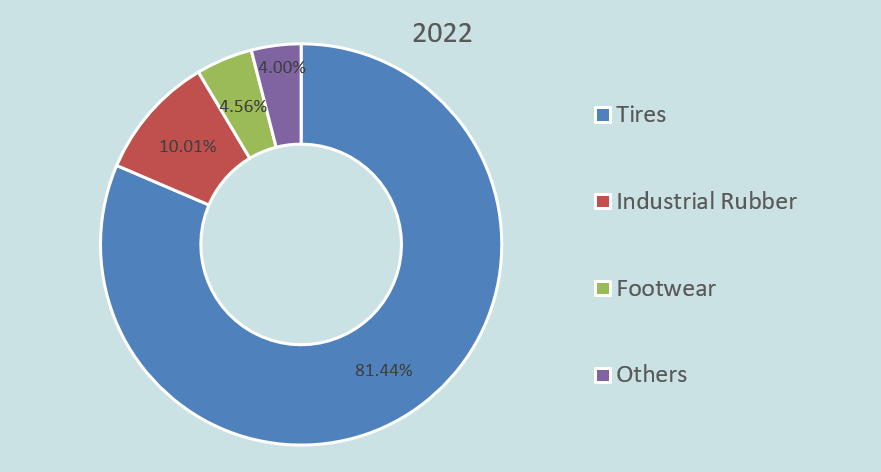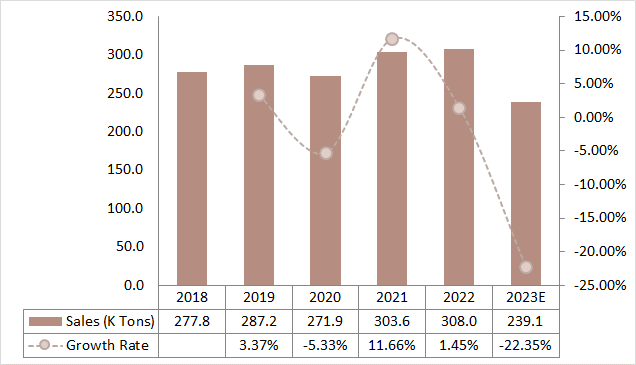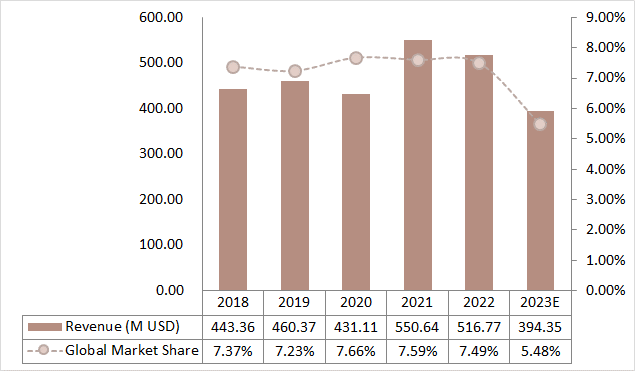1. Global Emulsion Styrene Butadiene Rubbers (ESBR) Market Analysis by Key Types
The global emulsion styrene butadiene rubber (ESBR) market is expected to achieve significant growth between 2018 and 2029. Specifically, the market size of cold polymerization type ESBR increased from USD 5708.09 million in 2018 to USD 9166.09 million in 2029, while the market size of hot polymerization type increased from USD 305.59 million in 2018 to USD 534.99 million in 2029. The overall market size increased from USD 6013.67 million in 2018 to USD 9701.08 million in 2029, showing a steady growth trend. During the forecast period from 2023 to 2029, the CAGRs of cold polymerization and hot polymerization were 5.07% and 5.79%, respectively, while the CAGR of the entire ESBR market was 5.11%.
Table Global Emulsion Styrene Butadiene Rubbers (ESBR) Market Size (M USD) Growth Rate by Type: 2018 VS 2023 VS 2029
| 2018 | 2023E | 2029F | CAGR(23-29) |
Cold Polymerized | 5708.09 | 6811.83 | 9166.09 | 5.07% |
Hot Polymerized | 305.59 | 381.59 | 534.99 | 5.79% |
Total | 6013.67 | 7193.42 | 9701.08 | 5.11% |
In the global emulsion styrene butadiene rubber (ESBR) market in 2022, the cold polymerization type occupies an absolute dominant position, with a market share of 94.75%, while the hot polymerization type occupies a market share of 5.25%. Cold polymerization ESBR has a significant dominant position in the market. Although hot polymerization has a smaller market share, it is still an important part of the market. Overall, the ESBR market in 2022 presents a pattern of cold polymerization dominance and hot polymerization supplementation.
Figure Global Emulsion Styrene Butadiene Rubbers (ESBR) Market Share by Type: 2022

2. Global Emulsion Styrene Butadiene Rubbers (ESBR) Market Analysis by Key Applications
The global emulsion styrene butadiene rubber (ESBR) market will achieve significant growth from 2018 to 2029. The market size of tire applications will grow from USD 4915.05 million in 2018 to USD 7836.66 million in 2029, with a CAGR of 5.01%. The market size of industrial rubber applications will grow from USD 585.39 million in 2018 to USD 1036.444 million in 2029, with a CAGR of 6.02%. The market size of footwear applications will grow from USD 286.63 million in 2018 to USD 418.14 million in 2029, with a CAGR of 4.10%. The market size of other applications will grow from USD 226.61 million in 2018 to USD 409.84 million in 2029, with a CAGR of 5.92%.
Table Global Emulsion Styrene Butadiene Rubbers (ESBR) Market Size (M USD) Growth Rate by Application: 2018 VS 2023 VS 2029
| 2018 | 2023E | 2029F | CAGR(23-29) |
Tires | 4915.05 | 5844.67 | 7836.66 | 5.01% |
Industrial Rubber | 585.39 | 729.95 | 1036.44 | 6.02% |
Footwear | 286.63 | 328.51 | 418.14 | 4.10% |
Others | 226.61 | 290.28 | 409.84 | 5.92% |
Total | 6013.67 | 7193.42 | 9701.08 | 5.11% |
Tires are the largest application area of the ESBR market, accounting for more than 80% of the market share, which shows that the tire industry has a huge demand for ESBR. Industrial rubber and footwear account for 10.01% and 4.56% of the market respectively, showing that these two areas also have significant demand for ESBR. Overall, the ESBR market in 2022 will be dominated by tires, supplemented by industrial rubber and footwear.
Figure Global Emulsion Styrene Butadiene Rubbers (ESBR) Market Share by Application: 2022

3. Global Emulsion Styrene Butadiene Rubbers (ESBR) Market Analysis by Regions
The revenue of the global emulsion styrene butadiene rubber (ESBR) market showed a fluctuating growth trend between 2018 and 2023. Revenue in North America increased from US$958.48 million in 2018 to US$1108.57 million in 2023. Revenue in the European market increased from US$996.63 million in 2018 to US$1143.55 million in 2023, showing an overall upward trend despite fluctuations in 2020.
Revenue in the Chinese market increased significantly, from US$1696.32 million in 2018 to US$2104.86 million in 2023, indicating that China has a strong demand for ESBR. The markets in Asia Pacific (excluding China) and the MEA & Latin America also showed a growth trend, increasing from US$1634.37 million and US$727.89 million in 2018 to US$1959.79 million and US$876.65 million in 2023, respectively.
From the overall market perspective, the global ESBR market has increased from US$6013.67 million in 2018 to US$7193.42 million in 2023, showing the market’s continued growth potential. This growth is due to the increase in market revenue in various regions, especially the significant growth in China and Asia Pacific (excluding China). Although the revenue growth in the North American and European markets is relatively stable, the overall market still shows a positive growth trend.
Table Global Emulsion Styrene Butadiene Rubbers (ESBR) Revenue (M USD) by Region (2018-2023)
| 2018 | 2019 | 2020 | 2021 | 2022 | 2023E |
North America | 958.48 | 1008.87 | 890.05 | 1132.67 | 1072.71 | 1108.57 |
Europe | 996.63 | 1044.46 | 909.07 | 1162.54 | 1102.78 | 1143.55 |
China | 1696.32 | 1810.31 | 1629.16 | 2102.72 | 2007.03 | 2104.86 |
APAC (excluding China) | 1634.37 | 1729.43 | 1514.52 | 1978.08 | 1878.52 | 1959.79 |
MEA & Latin America | 727.89 | 772.81 | 682.59 | 876.77 | 834.45 | 876.65 |
Total | 6013.67 | 6365.87 | 5625.39 | 7252.78 | 6895.49 | 7193.42 |
From 2018 to 2023, the revenue market share of the global emulsion styrene butadiene rubber (ESBR) market varies among different regions. Specifically, the market share in China will increase from 28.21% in 2018 to 29.26% in 2023, showing the growth potential of the Chinese market. The market shares of Asia Pacific (excluding China) will be 27.24% in 2023, slightly higher than 27.18% in 2018. The market share of North America and Europe is relatively stable, but slightly declining. The market share of the MEA & Latin America is expected to be 12.19% in 2023, slightly higher than 12.10% in 2018, showing a slight increase. Overall, the market share in China has increased significantly, while other regions have changed less.
Table Global Emulsion Styrene Butadiene Rubbers (ESBR) Revenue Market Share by Region (2018-2023)
| 2018 | 2019 | 2020 | 2021 | 2022 | 2023E |
North America | 15.94% | 15.85% | 15.82% | 15.62% | 15.56% | 15.41% |
Europe | 16.57% | 16.41% | 16.16% | 16.03% | 15.99% | 15.90% |
China | 28.21% | 28.44% | 28.96% | 28.99% | 29.11% | 29.26% |
APAC (excluding China) | 27.18% | 27.17% | 26.92% | 27.27% | 27.24% | 27.24% |
MEA & Latin America | 12.10% | 12.14% | 12.13% | 12.09% | 12.10% | 12.19% |
Total | 100.00% | 100.00% | 100.00% | 100.00% | 100.00% | 100.00% |
4. Synthos Group Emulsion Styrene Butadiene Rubbers (ESBR) Market Analysis
4.1 Synthos Group Basic Information
Table Synthos Group Basic Information
Item | Description |
Company Name | Synthos Group |
Website | www.synthosgroup.com |
Established Time | 1945 |
Headquarters | Poland |
Market Distribution | Worldwide |
Contact Information | Email: [email protected] Add: 1 Chemików St., 32-600 Oświęcim, Poland |
4.2 Product Overview
Table Product Overview
ESBR – Emulsion Styrene-Butadiene Rubber | ||||||||||||||||||||||||||||||||||||||||||||||||||||||||||||||||||||||||
ESBR is used in the manufacture of tires and technical rubber goods, such as conveyor belts, cables, industrial hoses, and anti-vibration parts for the automotive industry.
|
4.3 Synthos Group Emulsion Styrene Butadiene Rubbers (ESBR) Market Performance
In 2018, Synthos Group’s sales of emulsion styrene butadiene rubber (ESBR) reached 277.8 thousand tons, the price was US$1596/ton, the revenue was US$443.36 million, and the gross profit margin was 17.44%. However, by 2023, the sales volume dropped to 239.1 thousand tons, the price was US$1649/ton, the revenue was US$394.35 million, and the gross profit margin was 18.53%. Although the gross profit margin has improved, both sales volume and revenue have declined.
Table Synthos Group Emulsion Styrene Butadiene Rubbers (ESBR) Sales, Price, Revenue, Gross Margin (2018-2023)
Synthos Group | 2018 | 2019 | 2020 | 2021 | 2022 | 2023E |
Sales (K Tons) | 277.8 | 287.2 | 271.9 | 303.6 | 308.0 | 239.1 |
Price (USD/Ton) | 1596 | 1603 | 1586 | 1814 | 1678 | 1649 |
Revenue (M USD) | 443.36 | 460.37 | 431.11 | 550.64 | 516.77 | 394.35 |
Gross (M USD) | 77.33 | 83.28 | 69.58 | 129.79 | 96.14 | 73.08 |
Gross Margin | 17.44% | 18.09% | 16.14% | 23.57% | 18.61% | 18.53% |
Synthos Group’s ESBR sales volume fluctuated between 2018 and 2023, with sales reaching a peak of 308 thousand tons in 2022. However, sales volume fell to 239.1 thousand tons in 2023. The growth rate was 3.37% in 2018-2019, fell to -5.33% in 2020, and rose significantly to 11.66% in 2021, but fell to -22.35% in 2023.
Figure Synthos Group Sales and Growth Rate

Synthos Group’s ESBR revenue peaked at $550.64 million in 2021. However, revenue declined in 2022 and 2023, reaching $394.35 million in 2023. The global market shares also showed an upward trend between 2018 and 2020, reaching a peak of 7.66% in 2020. However, the global market share declined in 2023 to 5.48%.
Figure Synthos Group Revenue and Growth Rate 2018-2023

4.4 Synthos Group Overview
Synthos SA (Synthos) is a manufacturer of chemical raw materials. The company produces synthetic rubber and latex, styrene plastics and vinyl and acrylic dispersions. Its product portfolio also includes styrene-butadiene rubbers, polystyrene plastic, adhesives, agro, ethylbenzene, high styrene rubbers, and nitrile butadiene rubbers. The company’s products find applications in construction, chemical, furnishing, paper, food, rubber, textile, cosmetics, automotive, packaging, and paint industries, among others. It also carries out the production and distribution of thermal energy. The company also produces and sells plant protection products and biocides.
4.5 Synthos Group Related Developments
Trinseo sell rubber business to Synthos
May 26, 2021
Another long-time synthetic rubber producer is exiting the business. The styrenic polymer maker Trinseo has agreed to sell its synthetic rubber unit to Polish competitor Synthos for $491 million, including about $42 million in pension liabilities.
The Trinseo business had sales last year of $320 million. The unit’s manufacturing, R&D, and most of its 440 employees are located in Schkopau, Germany.
Synthos Enters into the Next Phase of Bio-Butadiene Technology Development to Produce Sustainable Rubber
February 09, 2022
Synthos announces that it has reached a major milestone in the development of advanced bio-butadiene technology. After completing a successful feasibility study in 2021, Synthos, Lummus Technology and its Green Circle business have concluded that the bio-butadiene technology is ready for implementation, and the companies have agreed to move into the engineering and design phase of the project.
Given the confidence in the technology and the strong market demand for renewable materials, Synthos has committed to building a plant with a capacity of 40000 metric tons of bio-butadiene per year – twice as much as the companies had originally planned. In addition to the plant capacity expansion, Synthos has confirmed that it will license BASF’s butadiene extraction technology from Lummus and leverage Lummus’ digitalization capabilities for operational efficiency and reliability.





